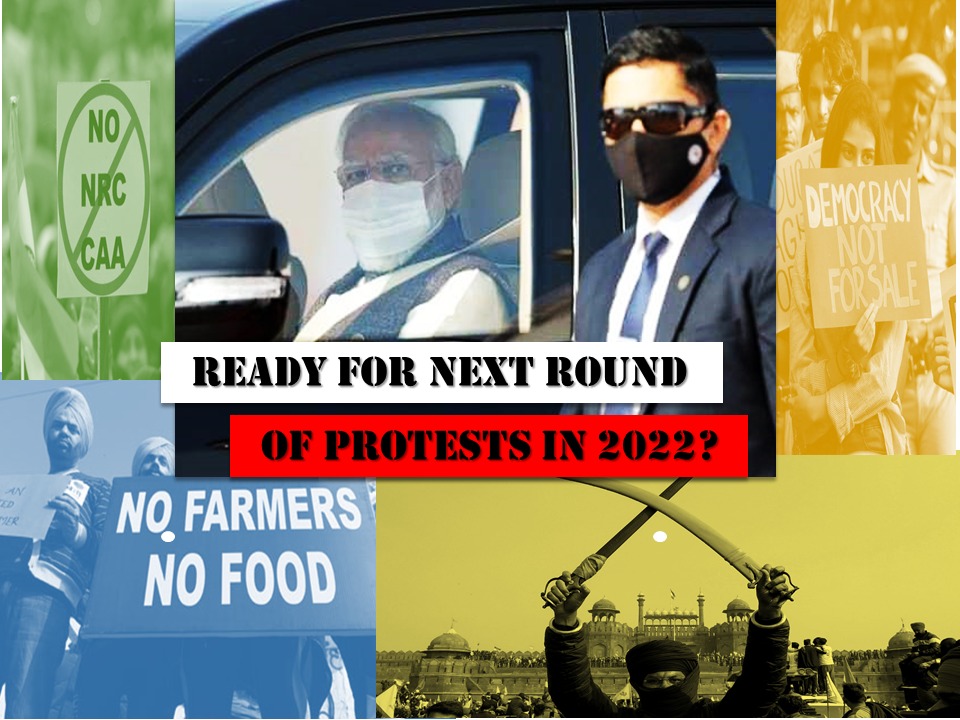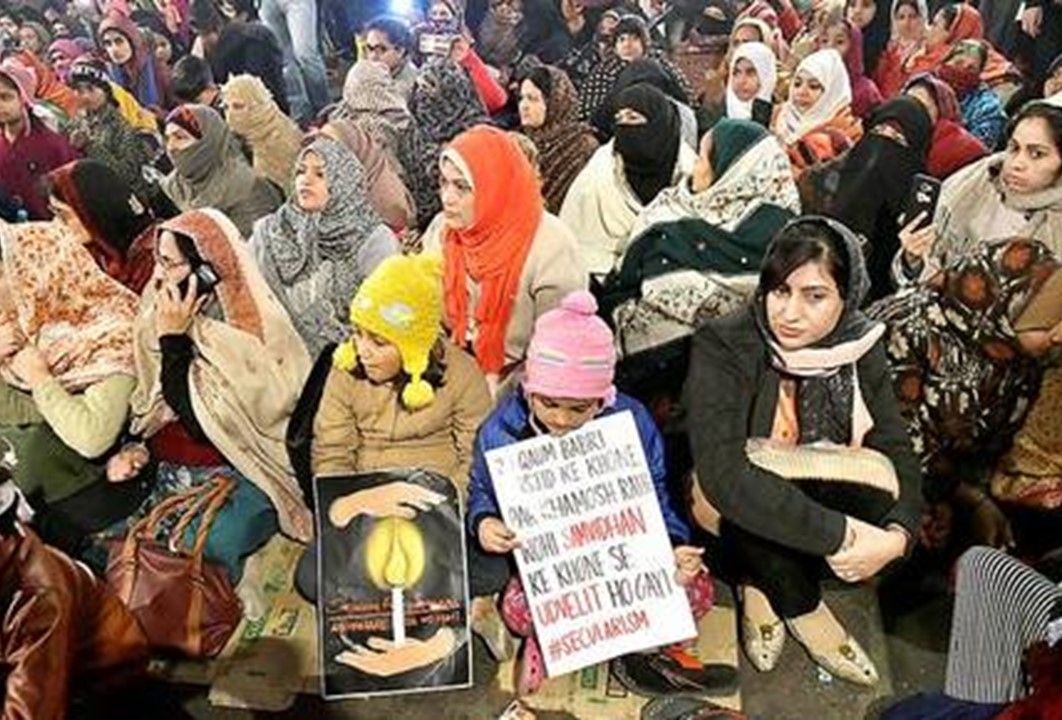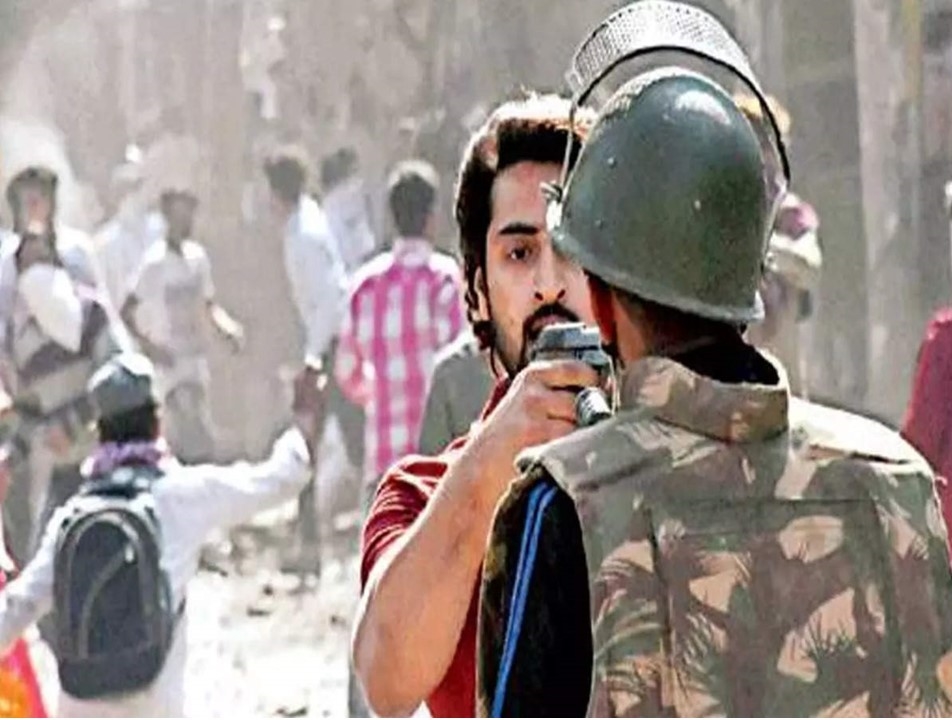
Destabilizing a Democracy Through Protests

D for democracy, demonstration, and destruction – these 3 words have kept India on tenterhooks since last 3 years.
Farmer’s protests saw the rise of ISI backed Khalistani terror groups, Almaty protests in Kazakhstan apparently has involvement of foreign agencies like MI6, Black lives matter in US saw China supplying weapons to Antifa, and Arab Spring was blamed on CIA. The trend is evident – myriads of protests across the world are not organic, they’re “manufactured”.
Two recent reports have put forward some interesting findings. One, 42% of all the protests that took place around the world have been successful in their mission. Two—3.5% population is enough to bring down a democracy.
India is a democracy that we are proud of. But if 3.5% of India’s populace, approximately 45,500,000 people desire, they can steer us to an undesirable future. Are we, as a nation ready for the next Tsunami of protests headed our way?
Are Protests Really “Democratic”?
There is not an iota of doubt that peaceful democratic protests are allowed in a democracy like India. When our constitution was being prepared it was Mahatma Gandhi, father of our nation, and his style of protests that were taken into consideration. Our constitution allows protests in some capacity.
Every citizen has the right to protest! This thought is the genesis of the behemoth protests like Arab Spring in Middle east in 2010’s, Rose revolution in Georgia in 2003, People’s Power movement in Philippines in 1986 and myriads of other such protests in the 20th and 21st century including Black Lives Matter.
Arab Spring had impacted mainly six countries, and were carried out against dictators, but it soon transmogrified into Arab winter, with Yemen, Libya and Syria being pushed into a rabbit hole of civil wars. Later there were reports on how Arab Spring was a chaos manufactured by intelligence agencies of developed nations. The strategy was simple– use a citizen as a weapon against the system.

Farmers protests is the most recent manifest of democratic protests in India, the latest development being Indian PM’s carcade brought to a halt for 20 minutes at Ferozepur, Punjab. Farmers law was supposed to organize India’s agricultural sector and connect India to the massive Indo-Arab- Mediterranean corridor. This is expected to bring lot of profit to the countries involved – India, UAE, Israel, Greece and others. But farmer’s protests managed to impede the process of organizing the agricultural sector in India, a sector which is considered the backbone of Indian economy.

Gene Sharp, a political scientist, in his book “From Dictatorship to Democracy” had elucidated on how a dictator can be taken down with protests.
India’s enemies being good at reverse engineering, did the same to Gene Sharp’s theory. They reverse engineered the method to push a functional democracy into chaos. This is how the author would like to break it into stages.
Destabilizing a Democracy in 4 Stages:
Stage 1: Agitation
Pick up a Faultline that exists in a democracy, spread misinformation, and then use it to rattle a certain section of a country’s populace. Use women and children for tactical appeal.
At this point it is important for us to comprehend that vast majority of those who join protests believe they are fighting for a cause, only few “leaders” among them would know which direction the protest will be steered in.

Shaheen Bagh protest, women and children used for protests
For example, Shaheen Bagh protests– the agitation against anti-Citizenship Amendment Act. It was largely a peaceful protest, initially. Media and other anti-government entities were utilized to purvey a narrative that –within India and outside it, a certain section is irked by Government’s decision, and that certain communities are facing injustice within India.
Government at this stage cannot do anything other than treat them with kid gloves. But Intel agencies in India were cognizant of the fact that close to Rs 120 crores was pumped into India at the initial stages of the anti-CAA protests in December 2019.
In a democracy like America the faultline which can be exploited is race, whilst in India it is religion.
Stage 2: Political unrest, wave of riots, thefts, and arson
Be it Shaheen Bagh protests or farmers protests, stage 2 was executed by causing riots on the streets of Delhi, capital of India.
At this stage political parties lend their support to the paid agitators and pressurize the government to crucify government officials who act against agitators. Such pressure by other political parties is used as an umbrella that protects the agitators and lets them carry out riots, thefts, arson with impunity. IB (Intelligence Bureau) security assistant Ankit Sharma and Constable Ratan Lal who lost their lives in anti-CAA protests were victims of stage 2.

Ankit Sharma, IB staffer, who was brutally murdered by the mob during anti-CAA protests
During Farmer’s protests, Khalistani elements made their presence felt and carried out lynching unabated at many places. There was also news of women being violated. This continued despite the arrests.
During Shaheen Bagh protests, NSA Ajit Doval’s meeting with a certain religious leader and onset of Covid in March 2020, had managed to whittle down the ferocity with which the protests were being carried out. Au contraire, during Farmer’s protests—the Farmer’s bill had to be repealed by the Indian Government.
Addressing the nation on Gurupurab, Modi said that the laws were brought in the best interest of the nation and were aimed at small and marginal farmers.
It is Indian Prime Minister’s statement after he repealed farmer’s law that was worth pondering. He said– he took the decision in the best interest of the nation. This is a bill Indian government had fought tooth and nail for, yet unexpectedly repealed it.

“Farmers” at Red Fort
Stage 3: Taking out High Value Targets and Economic Stifling
Next stage of Shaheen bagh protests may have been murder of a High Value Target (HVT) followed by chaos which would have impeded government’s action against paid agitators.
In India’s present scenario, the HVT can be anyone from a local political leader heading an agitation or the head of a political organisation from any camp— anti-government or pro-government. Such a murder would cause unrest at an unprecedented scale, with followers of the HVT running helter-skelter like headless chickens.
Spreading unrest among those carrying out agitation against government policies, would put tremendous pressure on the defence forces. Ideally, under such circumstances Rapid Action Force and paramilitary are the first to arrive at disturbed places. Ministry of Home Affairs (MHA) can deploy Central Armed Police Forces (CAPFs) to the state to assist the state civil police and armed forces. But if the situation remains unmanageable, then Army is moved-in to the place where the unrest has been continuing incessantly.
But how can we be sure that stage-3 is about elimination of a HVT?
On 28th Dec 2021, SFJ (Sikh For Justice, a pro Khalistani group) terrorist Jaswinder Singh Multani, was arrested in Germany by Federal Police from Erfurt, after highest level requests from Indian government were made to the German government. This terrorist was not just involved in Ludhiana court blast, but he had also plotted to kill Bharatiya Kisan Union president Balbir Singh Rajewal and spread unrest. Here Balbir Singh was the HVT.
With paid agitators sabotaging private and government properties, riots on the streets, murders of political figures and government officials, the enemy can utilize the opportunity to escalate internal chaos to next stage.
Stage 4: Escalation at the Border and Economic Predation
Mayhem on streets, which manifests itself into viral videos on social media would hurt not just the country’s image but also the trust foreign investors have in Indian govt.
Data says Farmers protests alone caused the following damage to the economy
• Function of 1800 factories on Delhi Haryana border was brought to a grinding halt.
• Indian economy had to bear over Rs 70,000 crore economic loss in Q3 due to farmers’ agitation.
It is always easier to attack an enemy who is weakened internally. If chaos ever takes a firm grip over India, then it would become an invitation to India’s enemies to open fire on the border. Conventional war is not the only possibility that the enemy would sift through but also economic loopholes, and ways to curb production within India will be exploited.
The Solution?
It has been repeatedly proven that ISI, Pakistan’s Spy agency with the help of China has been indulging in destabilizing India, by avoiding a direct confrontation or a conventional war. Their strategy is to repeatedly carry out mass protests within the country, which will eventually weaken India’s democratic pillars and bring a sense of hopelessness into the populace. What follows next is a perilous situation that works in favour of India’s enemies—who are not limited to India’s immediate neighbourhood.
Major protests held in India in the last few years
~ 2016, Jat quota agitation in Haryana, also protests which followed killing of Burhan Wani in Kashmir.
~ 2017, Jallikattu protests, Gorkhaland protests, and Tamil Nadu farmers protests
~2018, Caste based protests
~ 2019-2020, JNU protests followed by Anti CAA protests
~2020-2021, Farmers protests
How to Control Protests?
The problem is that our Police forces take crowd control measures only after a protest spirals out of hand. They are reticent to put in place measures to prevent escalation. Let us rummage through few cases where violent protests were effectively managed:
1) Russia & China: Russia despite being the largest country in the world and China the most populous, protests are rare in these countries. Hong Kong agitation in 2020 continued till the CCP decided to take harsh steps to curb the protests. It worked!
But both the countries are not democracies like India. Did that factor work in their favour?
When Kazakhstan was being crushed under violent “democratic” protests that began after 1st January 2022, Russia acted with alacrity and sent CSTO peacekeeping forces to bring Kazakhstan’s biggest city Almaty under control by the 5th day of protest.
2) Uttar Pradesh: Be it anti-CAA protests or the farmers protests, Yogi government had managed to ring fence the protests in the initial stages itself. UN human rights office’s and international media’s interference was snubbed. But it worked!
So the strategies which worked were:
1. Nipping it in the bud: Most of the large-scale protests started after there were intelligence reports of funds being transferred into India to cause destabilization. The administration expected an escalation, but reticence to crack the whip on inimical elements at the initial stages brought ignominy to Indian government. The massive amount of propaganda that was churned as a result, lead to violence at many places. But in Russia and UP’s case—prompt action by administration impeded the protests.
2. Democracy of vandalism must stop: Yogi govt managed to list leaders and protestors who had gone about destroying public property and forced them to pay for the damage they caused. Could there have been a better lesson for the protestors who assume it’s their right to carry out vandalism?
3. “Internet backed Protests”: Kazakhstan earned ire of the world after it shut internet down when country wide riots took place. India too had to face the heat for temporarily shutting down internet in Kashmir. But shutting down internet helped to prevent the situation from exacerbating.
4. Equipping Police well: Training them to handle unruly crowd. Good riot equipment should be issued to every single officer. Field force teams named and fully trained, radio protocol, incorporation of K-9, drones for crowd control etc– we saw none of this during anti-CAA or farmers protests.
During both anti-CAA protests and farmers protests two things were evident—our Policemen are neither well equipped, nor do they have the skills to control large crowds. Below is a picture of Policeman who faced a rioting mob with just a stick, while being threatened by a pistol. Justified?

5. Societal change: In countries like Japan, 40% of people have a negative image of violent protests. This comes from citizens who think like mature adults. Using mainstream media and social media, people will have to be consistently discouraged from participating in violent protests. This will not bring immediate results ergo it will have to be continued for a long period.
6. Violent protests need strict action—If a report says otherwise, then they are misleading people. We have witnessed how external forces with the intention to cause riots and destabilizing the nation, funds protests. Let us not forget that former Prime Minister Manmohan Singh had blamed NGOs, often funded from the United States and Scandinavian countries, for spearheading the anti-Koodankulam (nuclear power project) stir.
India is a democracy and not a kakistocracy– this should be a message sent out to rioters. India’s enemy sans a direct confrontation has managed to cause plethora of damage to not just normalcy within India but also to India’s reputation across the globe, while the enemy itself continues to remain ensconced safely among the paid protestors. Lackadaisical approach towards protests must stop.
****************
Disclaimer
The opinions expressed in this article are the author’s own and do not reflect the views of Chanakya Forum. All information provided in this article including timeliness, completeness, accuracy, suitability or validity of information referenced therein, is the sole responsibility of the author. www.chanakyaforum.com does not assume any responsibility for the same.
Chanakya Forum is now on . Click here to join our channel (@ChanakyaForum) and stay updated with the latest headlines and articles.
Important
We work round the clock to bring you the finest articles and updates from around the world. There is a team that works tirelessly to ensure that you have a seamless reading experience. But all this costs money. Please support us so that we keep doing what we do best. Happy Reading
Support Us





















POST COMMENTS (7)
Landlocking India—Warning Bells In Andaman And Kerala - Chanakya Forum
I2U2 Partnership - From Hormuz, Bab Al Mandab, Suez & IOR Perspective - Chanakya Forum
ASHOK IYER
Abhi Athavale
MK Singh Parihar
KEYUR KULKARNI
Cdr Sandeep Dhawan